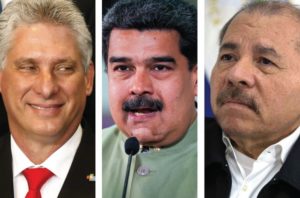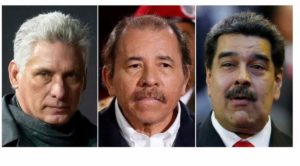UNITED STATES REAFFIRMS ITS POSITION TO “GIVE A VOICE TO THOSE WHO HAVE NO VOICE” IN CUBA, NICARAGUA, AND VENEZUELA
The State Department assures that the Biden Administration wants to support civil society and non-governmental organizations in those countries.
The United States Administration reaffirmed its position of “not giving money” to the governments of Nicaragua, Venezuela, and Cuba because they are “authoritarian and corrupt regimes” in which human rights are violated.
“We want to support civil society, we want to support non-governmental organizations, we do not want to support these authoritarian and corrupt regimes,” said Namita Biggins, a spokesperson in Spanish for the State Department, during an interview with the Voice of America.
Regarding Cuba, a country she referred to as “the evil influence” in Latin America, which has managed to penetrate Nicaragua and Venezuela, the spokeswoman warned that the situation “is deplorable and that it continues to deteriorate.” “In addition, in Cuba, we have seen the restriction of movement not only within the country but also of the right to leave the country. Cubans are fighting for their human rights and for their dignity,” Biggins said.
The United States will continue to support human rights defenders, activists, artists, journalists, everyone who is fighting for human rights and for their dignity, “emphasized Biggins.
Biggins pointed out that in those countries in the southern region of the continent “there have been continuous reports of police abuses, arbitrary arrests, incidents of torture, extrajudicial executions and excessive use of force.”
For his part, Secretary of State Antony Blinken presented the 45th Annual Report on Human Rights around the world on Tuesday. The document, which makes an exhaustive analysis of the situation regarding limitations of freedoms of the 198 member countries of the United Nations, also focuses on three Latin American countries: Nicaragua, Venezuela, and Cuba.
The annual report also shows, as in the other two countries, that in Venezuela there are also “free and fair elections.” “There is total impunity, no one is holding these perpetrators of human rights abuses responsible,” he said.
The “excuse” of the pandemic
The United States Government considers that some nations around the world have taken advantage of the pandemic situation to go overboard when it comes to placing restrictions on access to information, freedom of movement, and other issues that, according to the North American executive, they violate human rights.
The human rights report aims to “shed light on what is happening in these countries” and “give a voice to those who have no voice.”
SITUATION IN NICARAGUA AND VENEZUELA
In the case of Nicaragua, with President Daniel Ortega in power, Washington warned that his government “has not undertaken an electoral reform and prefers to oppress the pro-democracy opposition.”
Faced with this situation, the US executive has urged Ortega to urgently implement the bases for electoral reform as soon as possible with the aim of holding free and transparent elections.
“For our part, we want the Government of Nicaragua to implement the measures outlined in the 2020 OAS resolution so that there is an electoral reform before May this year to have free elections,” the spokeswoman said in her statements to La Voz. from America. “We are very concerned about human rights abuses and the dismantling of democracy in Nicaragua and how that can affect the region,” she added.
“In Venezuela, there is total impunity”
In Venezuela, with the country suffering the worst humanitarian, political, economic, and, now, health crisis, all the alarms have also gone off. Biggins denounced that in Venezuela “there is no freedom of expression, just as it does not exist in Cuba and Nicaragua, really.”
In that sense, she highlighted the difficult situation in which many independent media and journalists live, who from the Miraflores Palace are trying to silence them with repressive actions.
This report, which must be prepared according to US legislation, serves as a guide to Congress, which is the one that has to approve the budget items that are used in aid packages for other countries.
PRESIDENT BIDEN’S POSITION BEFORE LATIN AMERICA
President Joe Biden has assured that his foreign policy will prioritize the preservation of human rights, although at the moment it is unknown whether non-governmental organizations and other institutions with a presence in the most vulnerable countries will receive the most money. According to experts, one of the keys will be to fight against impunity and corruption in the region.
“I am not going to speculate on what measures, actions, or how much money the Congress or the Executive Power can give to these countries. What I do want to confirm is that these reports are very important to formulate our foreign policy and to make decisions,” he stressed State Department spokeswoman Biggins.
The United States insists that “human rights are at the center of the foreign policy of the Biden-Harris government.”
“We want to lead with the power of our example. We will continue to support human rights defenders, and human rights will be part of every conversation, every meeting, and we will continue to work at the multilateral level with our partners and allies. so that there is a difference, “concluded the White House spokeswoman in Spanish.
EEUU REAFIRMA SU POSICION DE “DAR VOZ A LOS QUE NO TIENEN VOZ” EN CUBA, NICARAGUA Y VENEZUELA
El Departamento de Estado asegura que la Administración Biden quiere apoyar a la sociedad civil y a las organizaciones no gubernamentales de esos países.
La Administración de Estados Unidos reafirmó su posición de “no dar dinero” a los gobiernos de Nicaragua, Venezuela y Cuba por tratarse de “regímenes autoritarios y corruptos” en los que se vulneran los derechos humanos.
“Queremos apoyar a la sociedad civil, queremos apoyar a las organizaciones no gubernamentales, no queremos apoyar a estos regímenes autoritarios y corruptos”, dijo Namita Biggins, portavoz en español del Departamento de Estado, durante una entrevista con la Voz de América.
Sobre Cuba, país al que se refirió como “la influencia maligna” en América Latina, que ha conseguido penetrar en Nicaragua y Venezuela, la portavoz alertó que la situación “es deplorable y que sigue deteriorándose”. “Además en Cuba hemos visto la restricción de circulación no solo dentro del país sino también del derecho a salir del país. Los cubanos están luchando por sus derechos humanos y por su dignidad”, manifestó Biggins.
Estados Unidos seguirá apoyando a los defensores de derechos humanos, a los activistas, artistas, periodistas, todos lo que están luchando por los derechos humanos y por su dignidad”, enfatizó Biggins.
Biggins señaló que en esos países de la región sur del continente “se han dado informes continuos de abusos policiales, de detenciones arbitrarias, incidentes de tortura, ejecuciones extrajudiciales y un uso excesivo de la fuerza”.
Por su parte el secretario de Estado, Antony Blinken, presentó el martes la edición 45 del Informe Anual sobre Derechos Humanos en todo el mundo. El documento, que hace un exhaustivo análisis de la situación sobre limitaciones de libertades de los 198 países miembros de las Naciones Unidas, también pone el foco en tres países de América Latina: Nicaragua, Venezuela y Cuba.
En el informe anual también se pone de manifiesto, al igual que en los otros dos países, que en Venezuela tampoco “existen elecciones libres y justas”. “Existe una impunidad total, nadie está responsabilizando a estos perpetradores de abusos de derechos humanos”, dijo.
La “excusa” de la pandemia
El Gobierno de Estados Unidos considera que algunas naciones alrededor del mundo se han aprovechado de la situación de la pandemia para extralimitarse a la hora de poner restricciones al acceso a la información, a la libertad de movimiento y otras cuestiones que, según el ejecutivo norteamericano, vulneran los derechos humanos.
El informe sobre derechos humanos pretende “arrojar luz sobre lo que está pasando en estos países” y “dar voz a los que no tienen voz”.
SITUACION EN NICARAGUA Y VENEZUELA
En el caso de Nicaragua, con el presidente Daniel Ortega en el poder, Washington advirtió que su Gobierno “no ha emprendido una reforma electoral y prefiere oprimir a la oposición pro democracia”.
Ante esta situación, el ejecutivo estadounidense ha instado a Ortega a implementar de forma urgente las bases para que haya una reforma electoral cuanto antes con el objetivo de celebrar comicios libres y transparentes.
“Por nuestra parte, queremos que el Gobierno de Nicaragua implemente las medidas delineadas en la resolución de la OEA de 2020 para que haya una reforma electoral antes de mayo de este año para tener elecciones libres”, dijo la portavoz en sus declaraciones a la Voz de América. “Nos preocupan mucho los abusos de derechos humanos y el desmantelamiento de la democracia en Nicaragua y cómo eso puede afectar a la región”, agregó.
“En Venezuela hay impunidad total”
En Venezuela, con el país sufriendo la peor crisis humanitaria, política, económica y, ahora, sanitaria, también han saltado todas las alarmas. Biggins denunció que en Venezuela “no existe la libertad de expresión, como tampoco existe en Cuba y Nicaragua, verdaderamente”.
En ese sentido subrayó la difícil situación en la que viven muchos medios y periodistas independientes a los que desde el Palacio de Miraflores se les intenta silenciar con acciones represivas.
Este informe, que se tiene que elaborar según la legislación estadounidense, sirve de guía al Congreso que es el que tiene que aprobar las partidas presupuestarias que se destinan en paquetes de ayuda para otros países.
POSICION DEL PRESIDENTE BIDEN ANTE AMERICA LATINA
El presidente Joe Biden ha asegurado que su política exterior priorizará la preservación de los derechos humanos, aunque por el momento se desconoce si organismos no gubernamentales y otras instituciones con presencia en los países con más vulnerabilidades serán los que recibirán más dinero. Según expertos, una de las claves pasará por luchar contra la impunidad y la corrupción en la región.
“No voy a especular sobre qué medidas, acciones o cuánto dinero el Congreso o el Poder Ejecutivo puede dar a estos países. Lo que sí que quiero confirmar es que estos informes son muy importantes para formular nuestra política exterior y para tomar decisiones”, subrayó la portavoz del Departamento de Estado Biggins.
Estados Unidos insiste en que “los derechos humanos son el centro de la política exterior del Gobierno Biden-Harris”.
“Queremos liderar con el poder de nuestro ejemplo. Vamos a seguir apoyando a los defensores de los derechos humanos, y los derechos humanos van a ser parte de cada conversación, cada reunión, y vamos a seguir trabajando a nivel multilateral con nuestros socios y aliados para que haya una diferencia”, finalizó la vocera en español de la Casa Blanca.
Agencies/ DDC/ Extractos/ Excerpts/ Internet Photos/ Arnoldo Varona/ www.TheCubanHistory.com
THE CUBAN HISTORY, HOLLYWOOD.











